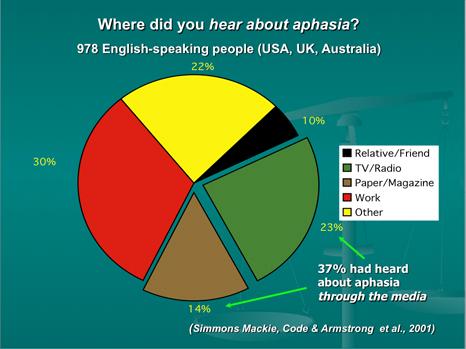Community awareness
Community awareness of aphasia should be raised
Reference: N/A
NHMRC level of Evidence: GPP
Rationale: It is well recognised that aphasia is a largely unknown disorder to the public (Code et al., 2001; Elman, Ogar, & Elman, 2000; Mavis, 2007; Simmons-Mackie, Code, Armstrong, Stiegler, & Elman, 2002). A lack of public awareness of aphasia has resulting economic, psychosocial, and political consequences (Elman et al., 2000). Various phone and face-to-face surveys across multiple English speaking countries show that while 9.25% to 18% of people have heard about aphasia, only 1.54% to 11.53% had some basic knowledge of aphasia (Code et al., 2001; Mavis, 2007; Simmons-Mackie et al., 2002). Public awareness needs to be raised by as many people affected by aphasia as possible, including speech pathologists. This can occur in both small and large ways across levels of care and service planning.
How much is known about aphasia?
Aphasia is a largely unknown disorder to the public (Mavis, 2007; Simmon-Mackie et al., 2010; Elman et al., 2000 & Code et al., 2001). A lack of public awareness of aphasia has negative economic, psychosocial, and political consequences (Elman, 2000). Surveys across multiple English speaking countries show that while 9.25% to 18% of people have heard about aphasia, only 1.54% to 11.53% had some basic knowledge of aphasia (Mavis, 2007; Simmons-Mackie et al., 2010 & Code et al., 2001). Many people hear about aphasia at work, so make sure you talk about it with your colleagues (Code et al., 2001).

RESOURCES:
How can I raise awareness of aphasia?
- View and share the "Understanding Aphasia" video - a free educational resource launched to increase awareness of aphasia for National Stroke Week in Australia (8-14th September 2014).
- Follow the ‘7 tips to increase aphasia awareness’ - Nina Simmons-Mackie and colleagues (2002) recommend 7 tips for increasing aphasia awareness.
- Build your own aphasia talk – La Trobe University has developed a ‘Build your own aphasia talk’ resource to be used by speech pathologists to develop community talks on aphasia for a variety of audiences including nurses, doctors, medical students, government services, community and health services, funding bodies and high school students. (Aphasia CRE Resources - Documents)
- Teach others by using aphasia simulations - Aphasia corner.com have developed aphasia simulations that can be used in teaching to help people to understand what it is like to have aphasia.
- Share Aphasia Information packs with people and their families - Aphasia Connect have developed a free informative information pack for people with aphasia.
- Display aphasia posters in your workplace - Lingraphica® The Aphasia Company™ created ‘the Aphasia Journey’ poster which was used at the ASHA conference in 2013.
- Promote 'Aphasia' - the movie. View the trailer.
References:
- Code, C., N. S. Mackie, E. Armstrong, L. Stiegler, J. Armstrong, E. Bushby, P. Carew-Price, H. Curtis, P. Haynes, E. McLeod, V. Muhleisen, J. Neate, A. Nikolas, D. Rolfe, C. Rubly, R. Simpson and A. Webber (2001). "The public awareness of aphasia: an international survey." Int J Lang Commun Disord 36 Suppl: 1-6.
- Elman, R. J., J. Ogar and S. H. Elman (2000). "Aphasia: Awareness, advocacy, and activism." Aphasiology 14(5-6): 455-459.
- Mavis, I. (2007). "Perspectives on public awareness of stroke and aphasia among Turkish patients in a neurology unit."Clin Linguist Phon 21(1): 55-67; quiz 67-70
- Simmons-Mackie, N., Code, C., Armstrong, E., Stiegler, L., & Elman, R., J. (2002). What is aphasia? Results of an international survey. Aphasiology, 16(8), 837-848. doi: 10.1080/02687030244000185
- Simmons-Mackie, Nina, Raymer, Anastasia, Armstrong, Elizabeth, Holland, Audrey, & Cherney, Leora R. (2010). Communication partner training in aphasia: a systematic review. Archives Of Physical Medicine And Rehabilitation, 91(12), 1814-1837.
GET IN TOUCH
l.worrall@uq.edu.au | |
+61 7 3365 2891 | |
Professor Linda Worrall |
RESEARCH PARTNERS







